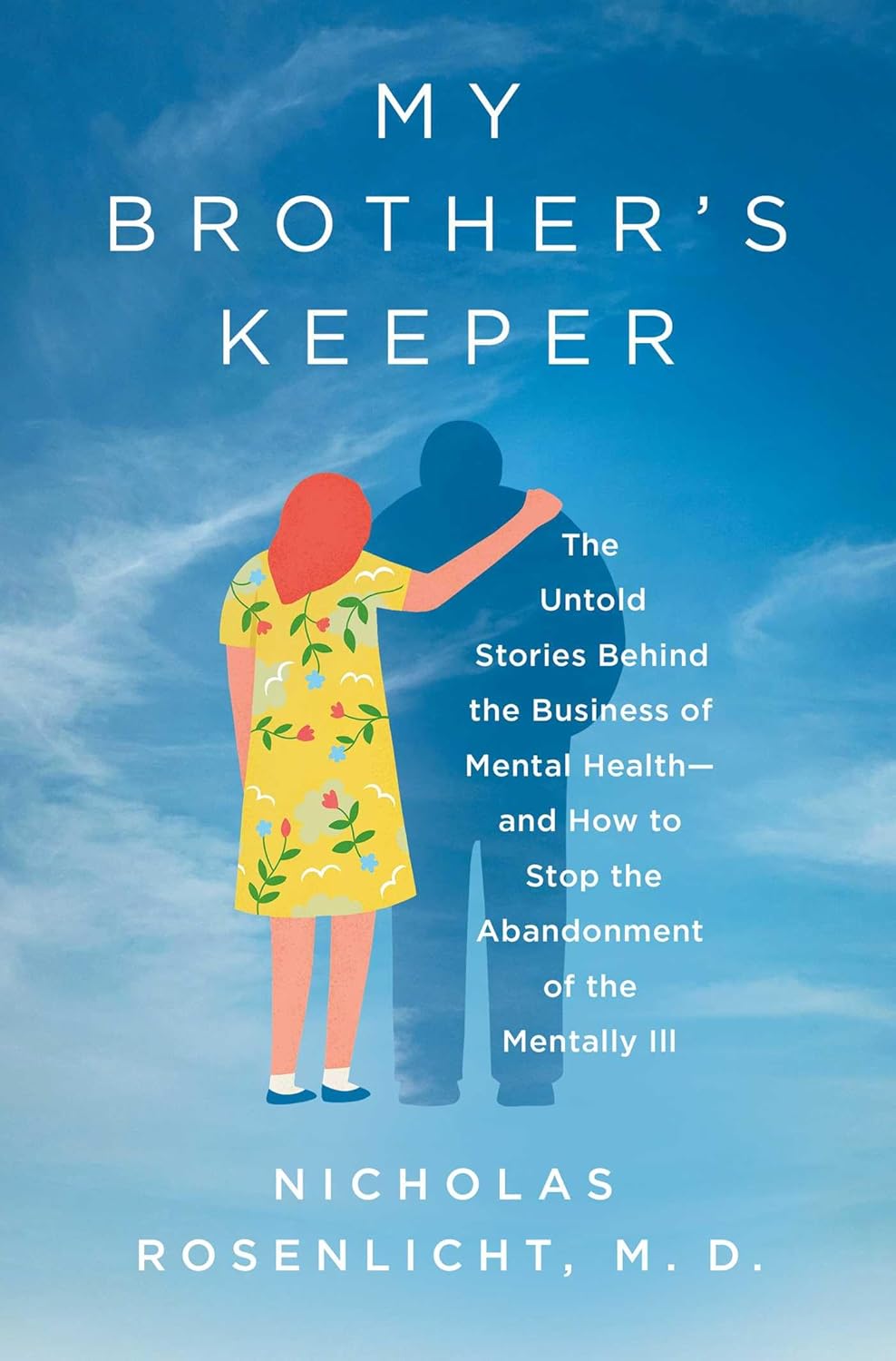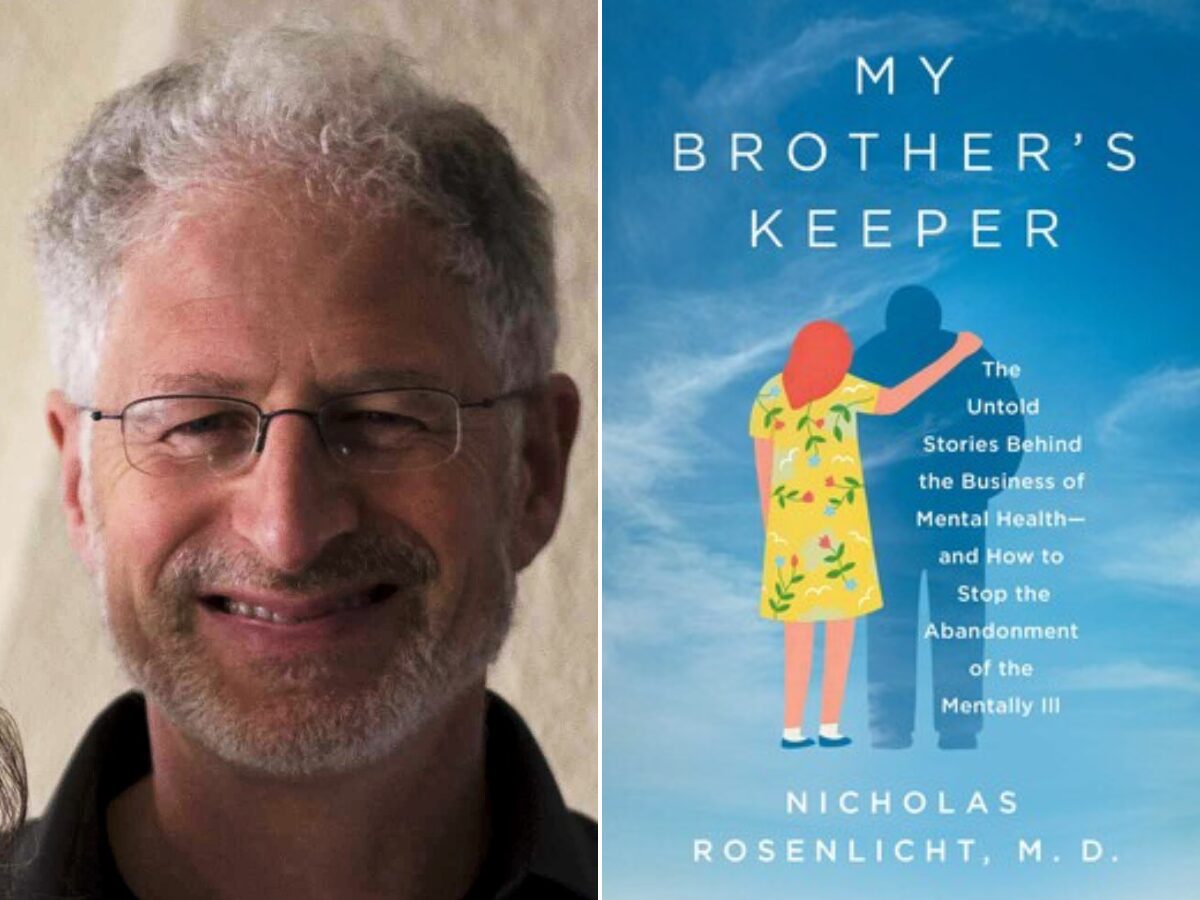In this episode, Guest Nicholas Rosenlicht, MD, a leading psychiatrist, discusses how he feels that mental health care in America has become nothing short of atrocious. It seems obvious that the system is broken, but the tragic truth is that it is actually functioning exactly as intended, providing reliably enormous profits for the corporate entities who now manage mental healthcare.


Episode Transcript:
Intro:
I’m Dr. Ed Bilotti and we are psyched for mental health. The companion podcast to WebShrink.com, which is the platform for providers and seekers of mental health care. My guest today is Dr. Nicholas Rosenlicht, author of the new book, my Brother’s Keeper, untold Stories of the Business of Mental Health and How to Stop the Abandonment of the Mentally Ill.
Dr. Rosenlicht is clinical professor at the University of California at San Francisco and has over 40 years of experience teaching and practicing psychiatry at top medical schools.
Nick, I’m pleased to have you. Thanks for joining me. I’m curious about the title of the book and how you arrived at it. Because the zeitgeist in our society today is hardly one of my Brother’s Keeper.
Nicholas Rosenlicht:
I think you put your finger on it. We exclude the mentally ill, and we’ll get into that, but I think. There, it was just, [00:01:00] that was the tip of the triangle. In the way people are being othered and isolated and less of a community. Mentally, I’ve always been other than put out of the community, but more and more now, that’s just how our whole community behaves. And, I’d heard, Hey, I’m not my brother’s keeper all the time, and people use it to excuse their behavior. I’m not responsible for that. I’m not responsible for others.
But actually if you look into it in the Bible. It is supposed to mean the opposite because it’s the excuse that Cain gave to the Lord. To try to hide the fact that he had killed his brother. And it’s an example of bad human behavior. Yet in our world today, it’s used as an excuse and because this is exactly what we’re doing to the mentally ill, we’re we are killing them and we’re hiding behind a financial system that allows us to do that.
Hey, you know you don’t have insurance. You don’t have a job. I don’t mean for you to die, but hey, that’s the [00:02:00] deal. That’s what we’re doing exactly to the mentally ill.
Edward Bilotti:
it’s not just the mental health system, Our healthcare system in general, a lot of people say, is broken. You have a different take.
Nicholas Rosenlicht:
Well, if you wanna find a primary care doc. You need to see a specialist for something that happens. You’re gonna wait for months and good luck. They may be outta network and you’re gonna pay.
So all these techniques that were used to exclude the mentally ill are now being used for all of us. It was the. The cutting edge of of corporate control of medicine, which is what’s happening. There’s several things that we’ve talked about.
That our healthcare system is broken. Mental illness isn’t real, so why should we take care of it? It’s really isn’t treatable anyway. Or it would cost too much, or these people don’t want help or it doesn’t affect me. And all of these statements, which I hear all the time are completely false.
Our healthcare system is not broken. It’s working exactly as it’s [00:03:00] designed and it’s designed so that if you wanna change things, you’re fighting against very powerful economic incentives
Until we have more of a unified approach that no, we all need healthcare and we pretend we don’t. We all almost need mental healthcare or certain people close to us, and until we start providing it and deciding what are the worthwhile ways we will provide it, rather than fighting whether you’re gonna get it or not.
I think until we have a unified system that recognizes that human beings need healthcare and many need mental healthcare, it’s gonna be a game of whack-a-mole.
Edward Bilotti:
In the book, you reference a graphic, um, showing the growth in numbers of healthcare providers, numbers of physicians , compared with numbers of healthcare administrators over the last several decades,
Nicholas Rosenlicht:
I think it’s from Wool Handler and Physician for National Health Plan. I have popularized it the fact is over the last 40 years, the number of healthcare workers has [00:04:00] gone up 95%, but almost all of them are administrators.
The number of physicians has gone up trivially. So in today’s healthcare system for every one physician, there’s 10 administrators. The majority of people working in healthcare have nothing to do with delivering health.
They’re part of managing this gargantuan financial system.
Edward Bilotti:
This corporate driven healthcare system motivated by profit.
Financial incentives has pushed doctors to spend less time with patients and more time on their documentation. You point out that doctors spend sometimes hours even late at night catching up on their lengthy notes, entering them into electronic medical record systems. And the purpose that this serves.
Nicholas Rosenlicht:
Using the Epic Electronic health record system comparing notes in the [00:05:00] US versus other countries. US notes are four times as long. It’s for documentation and coding because the record has become a financial system of how you can get repaid.
Americans spend it’s estimated 500 million hours a year on the phone with their insurer. If you think of the average time spent with your primary care doc is seven minutes face to face, and it’s not actually face to face, it’s side of the face because they’re, they have their face in the computer. We spend far more time with wrestling with our insurers docs spend something like two hours of pajama time doing electronic health record , and this is all serving the billing needs this vast system that’s working so hard to not pay or to offload payment to somebody else. The health record used to be to serve somebody’s health.
It now serves billing .
it all becomes about [00:06:00] procedures and, diagnoses and, it serves them to give people more diagnosis. I prefer when my patients are healthy or not giving them diagnoses that I can bill for.
But the incentives are different because the incentive is to deliver a unit of billable care. It’s not to make the person healthy.
Edward Bilotti:
The recent shooting of the CEO of United Healthcare in broad daylight in New York City, while obviously a crime and no one condones violence or murder, it did bring into the public awareness and attention the issue of how health insurers operate can you shed a little light on what kind of numbers we’re looking at?
What sort of money are these health insurance companies generating?
Nicholas Rosenlicht:
Oh man, I think it was 2023. The [00:07:00] revenue of UnitedHealthcare was $400 billion.
Healthcare is the largest and most profitable financial sector now, and for venture capital and private equity . The shareholder payouts have tripled over the last 20 years. Yeah. UnitedHealth last year was $394 billion in revenue and profit the year, 23 billion.
Profit payment from healthcare corporations to their investors in 20 22, 100 $70 billion.
Now, this is money that’s supposed to be going to making you and me better instead it’s going out to profit, but it’s counter as money that is for healthcare. The median income of healthcare CEOs is $30 million a year. If you look at the, there was a study looking at the board [00:08:00] members of the most highly ranked US hospitals.
These people are 44% from the financial sector. Investments funds, real estate funds. One in six people on hospital boards were healthcare workers. Doctors have always had to make money, but it was really more of a transaction, a barter, but you wouldn’t say no to treating them.
And it was more like, it was a negotiation between the clinician and the patient about what can you pay me? And now that would be fraud If you tried to negotiate the rate, you would charge a patient because that would be outside of a of the contract with the insurer and it could be seen as an inducement so that , is a crime under our system.
Edward Bilotti:
How did we get here, Nick? How did we go from doctors healing people to a giant corporate healthcare system driven by finances and profit.
Nicholas Rosenlicht:
In 1973, we were paying [00:09:00] 7.3% of our GDP to to healthcare. So we decided to implement the HMO Act, which was to bring business practices, economy of scale.
Economic checks and balances to healthcare. And it was thought that would make it more affordable. It’s done exactly opposite because it is decided, it is, let us see healthcare as a business opportunity rather than healthcare opportunity. And it provided grants and, loans to corporations to administer healthcare, and that’s what’s happened. And so since then, we’ve more than doubled the cost of our healthcare. Now it’s almost 20%, one in $5 in the United States are spent on healthcare. And we now pay twice as much as other advanced nations who all by the way have a national health plan. We’re the only advanced nation that doesn’t, and we pay twice as much. As other nations
Edward Bilotti:
now you say that many of us may be [00:10:00] complicit in this system and not even know it.
Nicholas Rosenlicht:
Our investment funds are into these healthcare companies when you invest in a fund, you want money, you’re paying them to get you money. During the COVID pandemic, the shareholders at Pfizer and, moderna voted not to share their technology with companies that could produce cheap vaccines for third world countries or poor Americans. They voted not to share their technology because it could cut into their profits. The, if you think about it, we’re investing in these things and we expect them to make money, and they don’t make money by making people healthy.
It’s like hiding the fact that your iPhone’s made by a 14-year-old kid in China working, 16 hour days. It provides a firewall that we don’t mean to harm other people, but this is just the deal. You handle my retirement fund, and please give me a large .
return, but we don’t recognize where it’s going [00:11:00] and how they’re making the money. It sanitizes the ability of us to screw fellow Americans or specifically, the most lucrative area of healthcare is these mental health investments. Largely because, the mentally ill don’t they’re not good advocates.
They’re often confused and their families are shamed, and so they can’t fight back. So the most aggressive suppression of care has been in mental health. The highest copays, the most restrictive. Benefits. The US Department of Labor last year just found there’s consistent ignoring of laws that are supposed to have equal rights and and benefits for the mentally ill.
It’s just routinely ignored.
Edward Bilotti:
You talk about the use of the term client, many mental health professionals, call the people they treat clients as opposed to patients, and you have some feelings about that.
Nicholas Rosenlicht:
In general, people just don’t wanna, mental illness is not pretty. The whole thing about calling it mental [00:12:00] health, it’s oh, we have a heart attack. I didn’t have a heart health crisis.
It’s all, oh, mental health, the calling. It’s we call patients clients. Mental illness because calling somebody mentally ill or a patient or a psychiatric patient is so threatening. So I’ve heard colleagues get angry when someone calls someone, they treat a patient saying, oh, don’t insult them.
But that’s because the term is like that, which will not be spoken. It is so threatening to call somebody psychiatrically ill, despite the fact that. Huge numbers of us and our relatives actually suffer from mental illness,
Edward Bilotti:
I think that terminology that’s used does affect the way we think about things. For example the term provider, which is now more or less universally used,
I think the use of the term provider serves the health insurance companies because it strips away the authority and power that’s associated with an [00:13:00] MD or a physician and puts it on an equal plane with other healthcare. Professionals who have not attended medical school and residency have not been trained to the extent that doctors are and are paid considerably less.
So it saves money for the insurance companies to have a non-physician provider deliver care, but it also is somewhat deceptive to the public because. Often people are confused and don’t know whether their quote unquote provider is a doctor or if they’re not a doctor, what is their training?
Nicholas Rosenlicht:
Under the Nazis, Jewish doctors were the term arts doctor was taken away when they’re called calling, basically I, illness handlers. To deny their expertise as doctors. And so provider is a term that that might apply to a healthcare corporation.
[00:14:00] cause they provide the generic healthcare. It doesn’t apply to the very personalized delivery of healthcare by a clinician. And the term provider by the way. There was a study where it’s gone up like a thousand times in the last 15 years, The brain, our most complex and least understood organ, your insurer will send you to see somebody probably with a master’s degree, two year degree to get treatment .
And if you stub your toe or lose a tooth or problem with the ear, you’re gonna have a doctorate level clinician at least monitoring or supervising a care. Mental health is the only area that due to business and financial considerations, you have somebody with a two year degree, we’ll take care of ’em.
The MFTs I know are very good and very dedicated, but why do we have this double standard?
I looked at the National Bureau of Labor Statistics. It’s a little bit old. The date I have the average payment to a master’s level therapist was $24 an hour. The [00:15:00] payment is so poor to mental health that we are just horribly understaffed.
60% of counties in the United States do not have a single psychiatrist, and I think close to a half or 40% don’t have a single psychologist. They are in urban areas, but, they just can’t make a living. And so that care just isn’t available. And that in 125th the number of beds, people just go without care and end up in prison, jail homeless encampments or stuck at home with their family.
Edward Bilotti:
Nick, I’m curious what you think of the emergence in recent years, I guess basically since COVID, but this explosion of companies providing subscription-based online web-based therapy services, companies like Better Help.
Nicholas Rosenlicht:
One I think they are trying to fill a gap in the availability of care, but they still [00:16:00] don’t make up for the fact that we have so few good clinicians because they’re not getting paid. And these companies, better health, for example, was. Had a big find because they were selling data, including diagnoses and medications of their clients.
I’ll call them ’cause that’s what they were to meta and and Google. And and, why should your health information be valuable? Because people can use it against you to either exclude you from care or to market things and other these online things, there was one that had 20 different people.
They called Elaine Smith. So they, people would think they were getting personalized care, the other thing is this is one more way to exclude the seriously ill or the really poor, because these services generally require technology, phones, apps, computers. More than ever they are catering to, the wealthy who can pay, and so the seriously mentally ill are being excluded and it’d [00:17:00] be nice. There was a recent study showing that some of these applications can be a. Benefit in addition to regular therapy and treatment. But the problem is most people, it’s their only, like if you have diabetes, yeah. Some app that helps you manage your diet is helpful. But in mental health, it’s the only treatment you get
the shame and the stigma around it. Yeah, you can do it in the privacy of your bedroom. It you can hide.
Edward Bilotti:
I’ve said many times to colleagues, I think the very existence of these companies is rooted in stigma. And they look at me puzzled and I say, well, look, you wouldn’t go to online subscription-based healthcare if you had a serious health condition, heart disease, cancer, um, you name it. But for mental health, it seems like.
That’s enough.
How were people with mental health conditions treated in the past, and how did things evolve into the system we have now
Nicholas Rosenlicht:
In Western society in the us, [00:18:00] basically they were lo, they were a family responsibility. They were locked in basements and pigs skies. They were kept in chains. Matter of fact, the now much derided asylum movement was a. Well-meaning effort to be kinder to the mentally ill, to give them a safe place where they weren’t gonna be chained up like animals, or out on the streets and people didn’t want mentally ill on the streets, was thought that it might be contagious.
Society has pretty much always excluded the mentally ill. I think it was Michelle Fuko says, it disturbs us to see people who can’t get control of their inner mind,
he said the mentally of those who cannot get a grip of their inner lives, and that is so much of who we are, and it’s so threatening to think that somebody cannot control who they are, that we just don’t wanna deal with yet who do, you know who hasn’t been affected by it? The relative, a friend’s kid, or we all, know [00:19:00] personally of people who have been horribly affected by it,
There was a whole bunch of reasons the asylums got shut down.
Yes. They were awful. Yes. We , didn’t wanna admit we’re treating people that badly. And there was a left wing, like ACL U, oh, you don’t wanna lock people up. There was a right wing John Burt society who really didn’t want any sort of government intrusion of any sort in people’s lives. And there was the new medications that we thought would cure mental illness.
And there was psychoanalysis, which could. Treat and prevent mental illness. We don’t need the asylums anymore. So they were closed. But the real reason, and it was really people like Ronald Reagan in California and Nelson Rockefeller in New York, who drove their states to the forefront of the institutionalization to save money. What was state funding for these institutions was never replaced, and instead we turned it over to insurers. Who were specifically excluding care of the mentally ill. So it became the societal abandonment of the mentally ill, because the [00:20:00] insurers didn’t want to pay for this.
They didn’t wanna pick up what used to be funded by federal and state funds. Why should they do that? So basically they were abandoned and psychiatric care went to private offices for people who had first rate insurance or would pay out of pocket. And today psychiatric visits are paid out of pocket. 15 times more than those to primary care doctor.
Basically, the very wealthy can afford care, but the rest can’t it’s become treatments for the wealthy.
They are getting what’s called trans institutionalization, which doesn’t have to do with, we’re not talking about gender here. That of the 500,000 who were in these institutions, we have four or 500,000 people who are now mentally ill who are in prisons three largest psychiatric inpatient.
Facilities in this country are Rikers Island Jail in New York, Cook County Jail in Chicago, and LA County Jail. [00:21:00] If you have a serious mental illness, you are 10 times more likely to be in prison or jail than in a psychiatric hospital. We have very few public psychiatric hospitals we have about one 25th, the number we did per capita as we did a generation ago.
And they’ve been replaced in part by these very expensive for-profit places that will only take you if you are fabulously wealthy, and will charge you on the order of $90,000. A month
but good luck if you can get care. If you don’t have great insurance. I can’t hospitalize my patients. Even though they may need and want it, unless they’re basically doing criminal behavior, like wanting to kill themself, wanting to kill someone else or so disorganized, they’re causing a disruption on the street.
The LPS Lanterman Petra Short Act, which was to avoid. A needed incarceration has now become the guidance for [00:22:00] voluntary hospitalization. That it’s basically keeping need people from needed care and not acknowledging that some people actually do actually need care and it’ll help them.
Frank Lanman, who wrote the act. 20 years later did an op-ed and then in the LA Times saying, my God, this is not what we intended. Keep people from care. We didn’t want people being locked away, getting inadequate care
Edward Bilotti:
So where are all the people that were once institutionalized? Where are they today?
Nicholas Rosenlicht:
Back in the fifties, we didn’t have massive homelessness. We had you had some skid row , , old hobos. But we did not have the, we have estimates vary, but we probably have 250,000 homeless mentally ill now. A number of reasons how people that don’t want ’em in their community and especially on the coasts, housing prices, have gotten so outrageous.
So what we have is people went, have gone from the hospitals to homelessness or prison and [00:23:00] often cycling between the two. Criminal justice system they’re the first responders to , mental healthcare crisis. We don’t send paramedics when somebody’s behaving, oddly, we send police they end up being handled in the criminal justice system,
You can’t necessarily blame him, but our system doesn’t have in any way of doing it. In 1963, his last act as president act, he signed before his assassination. A few weeks later, John Kennedy set up a system of nationwide
community mental health centers
to treat the mentally ill in their community and avoid hospitalization.
Trouble is it was never funded. Rosalyn and Jimmy Carter tried to revive it in the eighties, but it never went. And these places were never adequately funded. They were never adequately staffed. And so the. Mentally ill, especially the seriously mentally ill were abandoned.
Interestingly, an psychiatrist from Italy named Franco Baia. He visited [00:24:00] here for six months and he imported. The model largely to Italy, to mainly ti in the area, which is now the WHO model for psychiatric care, where people are treated they’re housed, they’re given jobs, they are part of the community.
And they need very few, something like six hospital beds in general hospitals for the a, a city of 240,000. People are managed outpatient with large use of peer counseling. They’re kept involved in the community. They are not excluders stuck in homeless camps. It’s under threat now by the right wing fascist government, just as mental health care in general is under attack here.
But these are models that actually work where instead of excluding them mentally ill, we realized that everybody, it’s on a spectrum, we, the mentally ill, we think of ’em as these weird, dangerous, they’re regular people with an illness we all know people who doesn’t have a uncle or brother or a cousin, and, yeah, [00:25:00] they’ve, and they need help, but they’re not some monster.
What do you mean by the term courtesy stigma?
Nicholas Rosenlicht:
Oh, that’s a term for those who treat the mentally ill, psychiatrists are mocked in media, the whole field is mocked because who would, actually deal with something that ugly I get teased all the time at parties and things, and people, ha what’s it like? And, but after the end of the party, they catch me by the coat room or they call me the next day, Hey, listen my, my wife is in real trouble, or my brother. But, there’s so much stigma around mental illness that even those who will treat it are ostracized
Edward Bilotti:
Another topic that you talk about in the book is the lack of progress in available treatments in psychiatry.
Nicholas Rosenlicht:
When I went into psychiatry 40 years ago, I thought, this is great. We’ve got, analysis is changing from four times a week on the couch to incorporating self-psychology and object relations, [00:26:00] and we’ve got cognitive behavioral therapy. We all these new medications, we have neuroimaging and the decade of the brain.
Man, I wanna be part of this. This is the area of medicines that’s gonna change more than any other. Left academia later and was back in practice, I looked around me and I realized we were doing a worse job of treating the mentally ill than we were 40 years ago. ’cause of the restriction on services and all that.
And if you look at it, these wonderful new medications, the best medications we have, were all. Prior to this Healthcare Revolution, business of Medicine, the best medicine for schizophrenia, far and away is clozapine. It’s been around, I think it was invented in the sixties, antidepressants. None of them work better than the old tricyclics.
Far and away the best treatment for bipolar disorders, lithium, which has been around for almost a hundred years.
We think about, ooh, ketamine. Ketamine’s been around for more than 50 years [00:27:00] too. Hallucinogens, they’ve been around for centuries. The problem is that what drives the adoption of a medication is its economic benefit, not its health benefit. And corporations have to, if they’re investing into drug development in our government is largely abandoning this sort of research.
They’re not gonna invest in something that might pan out in 20 years and revolutionize the care of something. They’re gonna invest in a Me too drug that can be brought to market in five years and can make a rapid profit. So the actual. Improvement of mental health is just not a priority for business.
It’s too speculative and it’s too far down the road. So we keep doing these pathetic me too drugs that are no better than the ones we have. And the advancements have been so meager.
What’s driving our care is finances not health.
what can we do about it, Nick? How can we fix it? How can we make it [00:28:00] better?
Nicholas Rosenlicht:
I think we do need a single payer system, not just for mental health, but mental health is like the worst case example of our lousy system, but. As I said, it’s like whack-a-mole. You can’t keep down. So many people interested in profit we really need to join the the rest of the developed world and have a good single pair system.
We actually have aspects of it. The VA is basically like the Britain’s British National Health Service. Which is under attack by the right wing Torries there. Our Medicare system is basically Canada’s national Health Service. So we, I think we can grow these things like Medicare so that more and more of our population gets covered and we can actually hold people to task, to be delivering quality care.
The first thing is that we need to join the rest of the world and get single payer. United States has the lowest life expectancy among developed countries. A kid [00:29:00] born in the United States, today is the first generation to have a shorter life expectancy than its parents. Why do we allow this to happen?
Largest lobbying sector in this country is healthcare. I think there’s something like two lobbyists for every member of Congress. The largest industry donating to federal campaigns is the healthcare industry.
These people are alleged. The people supposed to be representing us are representing healthcare corporation. This has to stop.
The park doctrine, which corporate officers can be held responsible for the harm they do.
it’s just not used. Why are we not using the existing laws that would reign in the power of these corporations? Corporations, not allowed to dictate healthcare policy. But when healthcare is so expensive, as our costs have driven up and. Individuals can’t afford it. The healthcare corporations are determining care because it’s what they will pay for, not what the person needs.
We [00:30:00] need to talk to our legislators to move towards single payer and use these laws that prohibit corporations from deciding what sort of healthcare we get.
Talking openly about about mental illness and it’s realizing it’s like any other illness and it’s, I. Treatable. It’s like any other chronic illness. It doesn’t, you don’t treat it once and it goes away. It may require long-term or lifelong care, but like other chronic illnesses like diabetes or heart disease , people do much better with care and
being more open, talking about it, not hiding behind words like client, which only entrenches and strengthens the stigma. Talk openly about it. And don’t hide. The LBGT community has made tremendous strides by not only using but embracing formally disparaging terms like queer or gay.
And , joining organizations, advocacy organizations, things like NAMI, national Alliance. On mental illness, there’s another Washington based organization. No health without mental health. [00:31:00] Physicians joining Physicians for National Health Program PNHP, or Healthcare Now, these organizations, we need to have a groundswell.
to your legislators, why are you supporting healthcare? Corporations making money on my illness. That’s not okay.
He’s not the most popular guy anymore, but Bernie Sanders and Debbie Dingle, and I think, pR Jaal. Have Justin introduced single payer legislation? Currently a majority of physicians, they, you’re single payer and a majority of people in this country favor it. Why are we not seriously moving ahead with it?
We are the only developed nation who has this archaic, cruel healthcare system. It’s time that we leave it behind.
Edward Bilotti:
Dr. Nicholas Rosen Lich, thank you so much for joining me and thanks for the work you’ve done on this book. The book is titled, my Brother’s Keeper untold stories of the business of mental health and how to stop the abandonment of the mentally [00:32:00] ill.
It’s available on Amazon. It’s available at your local bookseller, and you can also visit Dr. Rosen’s website. Nicholas Rosenlicht, MD, spelled R-O-S-E-N-L-I-C-H-T.
Thanks for listening to our podcast. This is Psyched for Mental Health, the companion podcast to WebShrink.com, which is the platform for seekers and providers of mental health treatment. If you are a mental health professional, please go to WebShrink.com and click on List Your Practice to be included in our Provider Directory.
Nothing contained in this podcast is intended to provide medical or mental health or substance use advice. If you have a concern about anything medical, mental health, or addiction related. This is not a substitute for evaluation by a [00:33:00] professional.

 Learn
Learn Read Stories
Read Stories Get News
Get News Find Help
Find Help

 Share
Share
 Share
Share
 Share
Share
 Share
Share



